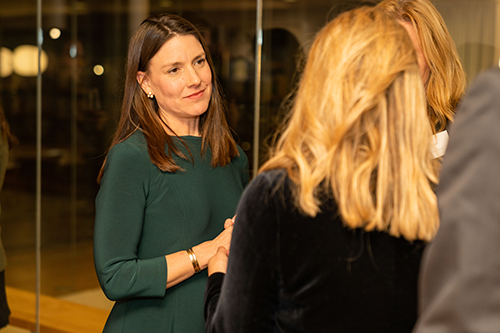by Karen Kariuki, Chief Strategic Officer, Grace Farms Foundation
What does it mean to make space for women? To bolster the strength and voice of women and girls?
During the month of March, Grace Farms Foundation will consider questions of gender equality through our Making Space for Women series, a curated set of programs and events ranging from small dialogues to larger public programs, from movement-filled activities to opportunities for reflection and contemplation, with the goal of coming together to pursue pathways of action toward advancing and sustaining change.

Karen Kariuki, Chief Strategic Officer, Grace Farms Foundation © Elias Rosario
The narrative that fosters “women’s issues” as an isolated topic is problematic — not just because framing it as such generates silos and the dissolution of ownership, but because, even as women, we are not all one voice, one experience, one perspective. As poet Audre Lorde so eloquently shared, “There is no thing as a single-issue struggle because we do not live single-issue lives.”
We recognize the conflict inherent in setting aside March as a month to discuss “women’s issues” while simultaneously acknowledging the advancement of women is imperative at all times. Our goal with this series is to explore how we advance the role of women in community not as a stand-alone concern, but instead as an interconnected part that is our collective responsibility.
Twenty-five years ago, it was professed at the Beijing Declaration and Platform for Action, “Human Rights are women’s rights and women’s rights are human rights.” Since then, conversations like #metoo, Time’sUp, GenerationEquality, and HeforShe have led to bold and global conversations about the inclusion and participation of all genders in creating global solidarity and sustainable change. But is the rhetoric aligned to movement, action, and change that can dismantle the silos of single-issue perspectives?
Our ongoing work at Grace Farms Foundation is reimagining what a thriving community might look like: how we support and engage each other; how we include and advance each other; and, most critically, how we see each other. There is a South African proverb, Sawubona, which means “We see you” supported by a community response of Ngikhona’ meaning “I am here.” By “seeing” others because of — and beyond — our differences, we seek to create authentic, engaged, and committed communities and transformative ways of living.
Seeing each other authentically is predicated on an acknowledgement that there are structures in place that make certain individuals and communities visible and invisible. To move toward a better, more inclusive, and more expanded view of a community, our Foundation is exploring the interdisciplinary practices, modalities, and pathways that will help us to better understand and connect with one another. We are examining what it means for individuals, communities, and systems to build and break down barriers to inclusion — all with the objective of fostering intentional, holistic, and belonging communities.
When we intentionally make space for women and girls, we are saying “we see you” and demonstrating with our actions that women belong in equal measure in the community alongside men and boys. History and current affairs show that women and girls have been marginalized, dismissed, made invisible and oppressed through political, economic, and cultural systems. Our goal for the Making Space for Women series is not merely to acknowledge Women’s History Month and International Women’s Day, or to celebrate women’s empowerment of the 100th anniversary of the 19th amendment that gave American women the right to vote. These are isolated moments in a movement that has not always sought to include all women and all girls, and has not always had the backing of all men. Instead, it is about understanding a constantly evolving sense of, definition of, and reality of community. It is an examination of this moment in time through the lens of women and girls that acknowledges our diverse backgrounds and our unique histories, with an eye toward where we can go together in the future.
It is also an acknowledgment that to achieve gender equality, to achieve female empowerment, we must consider that there are limits to asking women to harness more power. Rather, we have an opportunity to challenge our wider community to consider relinquishing some of their own power in order to advance the collective.
We believe that true change, true advancement, and true sustained impact happens when we take a cross-sector, interdisciplinary approach. We bring people and organizations together from differing perspectives to break down barriers and, as a result, generate new, actionable outcomes. The action we take today will have ripple effects for the future and offer tangible ways for us all to harness our individual and collective power to upend systems of oppression. By fostering communities that are civil, communities that flourish, and communities that are inclusive of all, we can achieve progress and sustained change.
At a very practical level, addressing gender inequalities is not only the right thing to do, but economically, politically and culturally, moving toward gender equality benefits entire communities, not just women and girls — and that together, we can achieve this bold vision. We invite you to join us on this journey.
Learn more about our Making Space for Women series and our work through our Community Initiative at Grace Farms.
Sign up for our newsletter to learn more about Grace Farms’ programs and our initiatives: nature, arts, justice, community, and faith.

